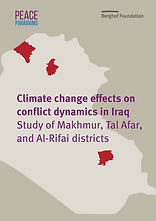PUBLICATIONS
You will find here Peace Paradigms' latest publications.
Toolkit on climate-focused mediation and dialogue: Insights from Iraq
September 2025
This toolkit offers insights, examples and key elements of an approach to addressing climate change related tensions and conflicts at the local level in Iraq through mediation and dialogue. Its aim is to offer both conceptual insights and practical perspectives on the topic extracted from our dialogue and mediation engagement in Iraq and from interviews with Iraqi dialogue facilitators and mediators.
This toolkit was created as part of a cooperation project with the purpose of Strengthening Iraqi Capacities to Respond to Climate Risks and their Impact on Existing Conflict Dynamics. This project, implemented by the Berghof Foundation and Peace Paradigms Organisation (PPO) with support from the German Federal Foreign Office, is part of the Weathering Risk Peace Pillar led by adelphi.
This description was retrieved from berghof-foundation.org
Read in English or in Arabic.
To read the interactive online version, visit Berghof Foundation's website!
Power-Sharing for Peace? Between Adoptability and Durability in Lebanon, Syria, and Iraq
October 2024
Allison McCulloch (Brandon University), Sibel Gürler (swisspeace), Sahar Ammar (swisspeace), Soeren Keil (the Institute of Federalism), Eduardo Wassim Aboultaif (Holy Spirit University of Kaslik), Clara Pergola (Peace Paradigms), Jibril Kallas (swisspeace) and Manar Zaiter (the Arab NGO Network for Development).
Published by Swiss Peace Foundation - swisspeace.
This working paper is based on a multi-methods collaborative research project, which explores the relationship between peace and power-sharing in Lebanon, Syria, and Iraq. Specifically, the project investigates the conditions under which power-sharing agreements are adopted (what we refer to as adoptability) as well as whether such agreements, once adopted, can deliver durable peace and functional governance (a process we refer to as durability).
This description was retrieved from swisspeace.ch
Upscaling peace-positive climate action and climate-informed peacebuilding: Lessons learned and ways forward
August 2024
Nina Schmelzer (adelphi), Beatrice Mosello (adelphi), Caroline Kruckow (FriEnt), Nina Strumpf (FriEnt), Ammar Zakri (Peace Paradigms).
Currently, 90% of climate finance targets middle-income, high emission-producing countries leaving conflict-affected communities with a fraction of the needed funds to adapt to climate impacts. Not only must funding increase, but it must account for the special challenges of conflict-affected countries. This practical note captures 8 key takeaways on peace-positive climate action and climate-informed peacebuilding providing recommendations for multilateral and bilateral donors, policy-makers and practitioners.
This description was retrieved from weatheringrisk.org
Climate security challenges in Iraq. Entry points for local-level dialogue.
December 2023
Iraq has begun to feel the brunt of climate change and an increase in climate-related security risks. The country’s vulnerability to climate change is a product of a high degree of exposure to climate change factors, a susceptibility to be affected by climate change, and a lack of capacity to adapt and respond to the effects of climate change through weak governance, structures and mechanisms.
The effects of climate change have only exacerbated the countless challenges facing the country, particularly those associated with the recent conflict with so-called Islamic State (aka ISIS), as well as the two main drivers of tension and conflict in the post-2003 period, political exclusion and poor governance.
This study seeks to delve deeper into the issue of climate change and its links to and effects on conflict dynamics throughout the country. Specifically, it examines nine districts spanning the provinces of Basra, Kirkuk, Al-Qadisiyah, Salahaldin, and Sulaymaniyah, exploring the ways in which climate change is contributing to conflict and insecurity in these districts through an analysis of climate security risk pathways.
Climate change effects on conflict dynamics in Iraq: Study of Makhmur, Tal Afar, and Al-Rifai districts
September 2023
The negative effects of climate change and the security risks associated with it are beginning to register across Iraq. Over the past decade, the rise in extreme weather events, such as high temperatures, droughts, desertification, flooding, and sand and dust storms, has caused various severe consequences.
This study seeks to delve deeper into the issue of climate change and its links to and effects on conflict dynamics throughout the country. Specifically, it focuses on climate pathways – or the ways in which climate change is contributing to conflict and insecurity – in Makhmur, Al-Rifai and Tal Afar districts.
Local peace processes inside and outside Iraq have increasingly gained attention as a successful model to address for example issues of displacement or inter-community disputes, but it remains an emerging field of studies.
In an attempt to support the broader community of practice of peacebuilders to design and implement quality programming, harnessing lessons learned and best practices from past experiences, a toolkit on local peace processes was developed. Inspired by the Iraqi experience, it is also based on a review of global best practices.
Chapter One covers best practices and lessons learned from the global experience with local peace processes. Chapter Two provides an overview of the Iraqi experience with local peace processes, and includes a description of their main characteristics, lessons learned, and an assessment of their comparative effectiveness and links to global best practice. Chapter Three provides guidelines and recommendations for those wanting to design, implement and support local peace processes.
Local Peace Processes and Agreements in Iraq: Reflections and Lessons Learned
December 2020
Since the fall of ISIS, local peace processes in Iraq have emerged at the forefront of the peacebuilding agenda. This report reviews some of the key local peace processes and agreements in Iraq since 2015, focusing on processes supported by international donors, and implemented by international and national organizations, including non-governmental organizations. It aims to provide the peacebuilding practitioner community with a critical reflection on those processes:
Which factors influenced the success (or not) of peace processes? What are some of the lessons learned? Ultimately, what does this mean for ‘good practice’ going forward?






-1_page-0001.jpg)
